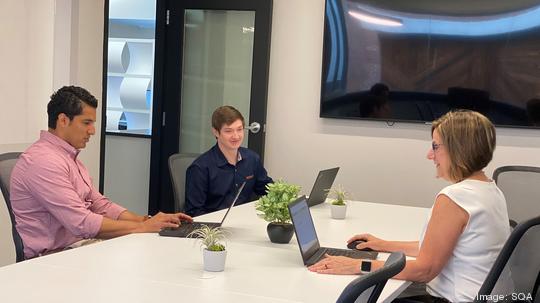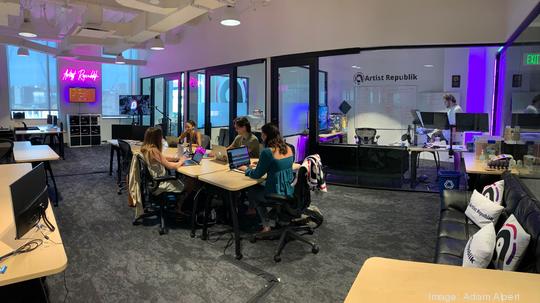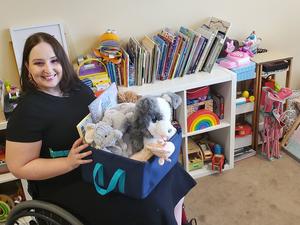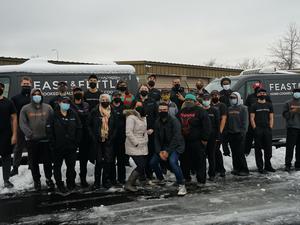
Prior to the coronavirus pandemic, a lot of people would have been happy to skip the morning commute on most days to work from home remotely and site at their desks in a nice comfortable pair of sweatpants.
But after more than a year of isolation and a lack of in-person interaction, businesses and their employees are happy to finally be returning to the office as the world reopens.
“Our team is thrilled,” Adam Alpert, co-founder and CEO of Pangea.app, a freelance platform for college talent, told Rhode Island Inno. “Everyone is so stoked and energized to be back in an office together, especially the interns.”
Pangea, along with several other burgeoning Providence startups, are back to working out of the Cambridge Innovation Center in downtown Providence, where Alpert says there are now 50 young adults running around and back on the grind. Because CIC allows fully vaccinated people to work inside without a mask on, Alpert described things as more or less back to normal, although he said he has noticed people washing their hands a little bit more.
While things are returning to normal, the idea of what "the office" means and how it is used has changed dramatically in what many are calling the new era of work. Alpert said there is definitely more flexibility baked into the typical week, and remote work is viewed as a “toolkit.”
“We are probably going to have [some] structure in our week, where we have all of our meetings on one day, basically, just a meeting day, and then there will be certain days of the week, at least, where there are no meetings,” he said.

Hybrid approach, mental health
Providence-based tech consulting and advisory firm, SQA Group, has also returned to the office and is embracing a hybrid-first model, where people come into the office a few days a week and then have the flexibility to work remotely on other days.
Jennifer Taylor, the chief people officer at SQA Group, which has 60 employees, said the company’s primary focus is around supporting each individual to make sure they feel safe and supported whether they are working fully in the office, fully remote, or on a hybrid model.
“People spent the last 16 months rethinking so many facets of their life, particularly how and where they work. As leaders, we need to build our workplace culture in support of the newfound realizations from our teams,” said Taylor. “What remains top of mind and a core driver always is being very conscious of mental health.”
Taylor said she thinks it’s important to be cognizant of the fact that people need time to re-acclimate to the office and the new world at their own pace because people still have health considerations and need to think about what works best for their families.
There are two questions Taylor says she is constantly thinking about: What does it look like when everyone is operating at their highest velocity? And how do you get there in a hybrid work state? What works for one employee may be very different then what works for another, she said.
Living, working together
The pandemic tested employers large and small on how to maintain a sense of camaraderie and company culture while everyone was stuck inside their homes, with little social interaction.
Taylor said SQA Group during the pandemic focused on running lots of virtual events, such as afternoon yoga stretch sessions, and now does lots of lunch breaks at neighboring restaurants. Additionally, the company has an online recognition program, so employees can receive validation for their work regardless, of whether or not they come into the office.
At Pangea, after working remotely for most of 2020, the team ended up moving in together — setting up an office where they lived, so they got some semblance of an office-like environment. Alpert, along with CTO John Tambunting, already had lived together and when a room in their house became available, lead designer Tae Sam Lee Zamora moved in, and the company invested a little bit of money to create an office-like setting.
“For us, as a pre–Series A startup, there are so many things you need to work through that are really hard to do when you are 100% remote,” said Alpert. “So many white-boarding moments and Post-it Note moments, and little things that happen throughout the day, so we find being in person is really helpful.”
While the office still holds a critical role, both Taylor and Alpert acknowledge that it is a different role than prior to the pandemic.
One benefit from the pandemic, according to Taylor, was that SQA was able to expand its search for talent beyond the local geography, and found some high-quality employees that really contributed to the company’s growth. Part of the reason for going with a hybrid-first model is so SQA can continue to partner with the best talent available, she said.
Alpert also knows that the role of the office has changed. While the company has more than half of its people at CIC, there are other contractors and people helping that are still working remotely. And the flexibility with coming into the office is real.
Because there will be at least a few days every week where people don’t need to be in the office, Alpert said it’s perfectly fine for employees to take off for a long weekend on Thursday night and work remotely Friday if they want. One of Pangea’s employees is going on a road trip for two weeks and will be working remotely.

But even with the change, Alpert still views the office as a fundamental part of building real company culture, at least for Pangea.
“How do you build culture in a remote environment in a way that isn’t contrived?” he said. “When you are in person you have all these smaller moments and exchanges that allow you to build really great relationships.”
The other thing is that employees at Pangea really have had a big desire to be in the office. For instance, Alpert asked this summer’s interns if they wanted to do their internship remotely or come to Providence. All of them chose Providence and are now living together in a house in Providence.
“This last year taught us that we can trust that people -- even when they are remote -- are being productive,” said Alpert. “I don’t think it needs to be so binary. It doesn’t need to be like everyone is back in the office every day of the week nine to five, but I think for us we’ve always really enjoyed working well together and that’s our culture.”








